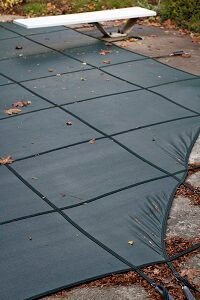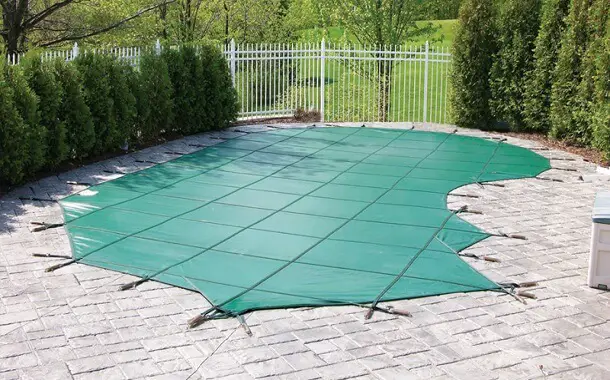Pool Closing Service Costs
Last Updated on December 29, 2023
Written by CPA Alec Pow | Content Reviewed by ![]() CFA Alexander Popinker
CFA Alexander Popinker
At the end of each season, as the temperatures drop, you need to prepare the pool for the cold season. The same process applies if you have a long-term departure, such as moving to another country or city for a certain period of time. It is necessary to perform specific operations for the wintering of the pool in order to facilitate the start of the pool easily in the next season.
How much does the pool closing service cost?
If you are thinking about having your pool winterized by a professional, you should budget anywhere between $135 and $400. The minimum amount of money paid by a homeowner was around $55, while the highest reported price was $720. However, the national average reported price is $240.
In the table below you will find the average costs for pool closing services, charged in different states from America.
| City | Average Price Paid |
|---|---|
| Charlotte, NC | $330 |
| Boston, MA | $270 |
| New York City | $275 |
| Newark, NJ | $370 |
| Barnstable, MA | $260 |
| Philadelphia, PA | $365 |
Hiring a professional pool company vs. DIY
The cost of a pool closing service performed by a professional depends on the condition of the pool and the geographical location. However, most of the pool servicing companies charge anywhere between $135 and $400 to winterize and close a pool, as we mentioned above. Obviously, the higher price is charged for the large in-ground pools, while on the lower end of this price range fall the small above-ground pools.
IF you are skilled enough and you know what you have to do, closing and winterizing a pool can also be a DIY project. This “IF” is written in capital letters because everything can turn into major damage if you skip even one important step. However, if you decide to go through this project on your own you must follow all the manufacturer’s instructions step-by-step.
On the other hand, you may want to hire a professional to explain the process and/or handle the first closing and winterizing if you are a first-timer. Also, you will want to hire a professional if you are dealing with a public pool.
Important things to consider
Closing the pool is a process that, when properly performed, helps to extend the life of the pool and saves us from any trouble in the coming season. The pool installation must be emptied to prevent it from breaking during the winter (due to frost) and the water remaining in the pool must be treated chemically to prevent the deposition of algae and limestone on the walls of the pool.
You might also like our articles about the cost of an endless pool, a pool house, or pool remodeling.
The pool should not be completely emptied during the winter, especially in areas with severe winters. The pool water acts as a pressure stabilizer that acts on the walls and bottom of the pool. Moreover, the water acts as a thermal stabilizer, preventing the contractions of the earth during the frost period.
How to close a pool
Pools often deteriorate over time, precisely because of the owners’ lack of experience with the steps needed to protect them from the effects of frost and prolonged non-use. Here are the steps you need to follow to close a pool.
- Clean the pool for winter
 Even before the pool closes for winter, one last cleaning is very important. This step can save you from some unpleasant surprises with the reopening of the hot season because clean water means first of all a more chemically balanced water. Also, by carefully cleaning the pool, you make sure that algae spores that can multiply over the winter are not left behind.
Even before the pool closes for winter, one last cleaning is very important. This step can save you from some unpleasant surprises with the reopening of the hot season because clean water means first of all a more chemically balanced water. Also, by carefully cleaning the pool, you make sure that algae spores that can multiply over the winter are not left behind.
- Test the chemical balance of the water before closing the pool
Even in the off-season, it is important that the factors that influence the chemical balance of the water remain under control. Otherwise, the water could become corrosive, which may even irreparably damage your equipment, and the chemicals you will add over the winter will not be as effective as if the water is properly balanced.
The pH level should be between 7.2 and 7.6. The alkalinity must be between 80 and 120 ppm (parts/million) and the hardness between 180 and 220 ppm. The products needed to make these chemical adjustments are commercially available.
- Apply a chlorine shock treatment before closing the pool for the winter
Specialists recommend applying a final chlorine shock treatment a few days before closing the pool for winter to ensure that the facilities are properly cleaned and that there is no risk of algae spores or germs being deposited during the winter. You can also apply a dose of algae treatment for preventive purposes.
- Reduce the water level in the pool
During the winter, the water level should be 1 to 24 inches below the last parts embedded in the pool walls: skimmers, nozzles, light bulbs, and other devices. These holes will be closed with special plugs and the water in the installation will be eliminated.
- Clean filters and recirculation pump before winter
It is very important not to leave the filter dirty over the winter, regardless of the filtration system you use. In the case of a cartridge filter, it must be removed and cleaned with a special substance and then left to dry. In the case of a sand filter, it can be cleaned using the “backwash” function.
- Remove water from the pool installation to avoid freezing and breaking of it during the winter
If there is a risk of frost, experts advise us to drain the water from the pool installation or use antifreeze to prevent freezing and breaking them. If you opt for the first option and remove all water residues, the use of an antifreeze solution will not be necessary.
Emptying the wastewater from the installation involves introducing air at a higher pressure, which is why there is a risk of breaking it. This step of the process can be more complicated, especially if it is done for the first time, in which case it is recommended to seek the help of a specialist.
- Remove all accessories from the pool edge during the winter
Remove accessories such as stairs, handrails, trampolines, slides, countercurrent swimming systems, and waterfalls during the winter. Prolonged exposure to cold, frost, and chemicals added to the pool can cause damage and even rust.
- Use ice breakers to prevent possible damage to the finishes
As the water increases in its volume while it’s freezing, during the winter there is a risk that the walls and finishes of the pool may be damaged for this reason. Specialists recommend the use of floating icebreakers that will protect the finishes of the pool due to their ability to prevent the formation of ice. They are loaded with sand and can be mounted either around the perimeter or diagonally.
- Cover the pool with a winter tarp
Specialists recommend the use of an automatic tarpaulin with PVC slats that provides maximum safety for both children and pets and that effectively covers the pool, eliminating the risk of dirt particles entering inside during the winter.


Leave a Reply
Want to join the discussion?Feel free to contribute!